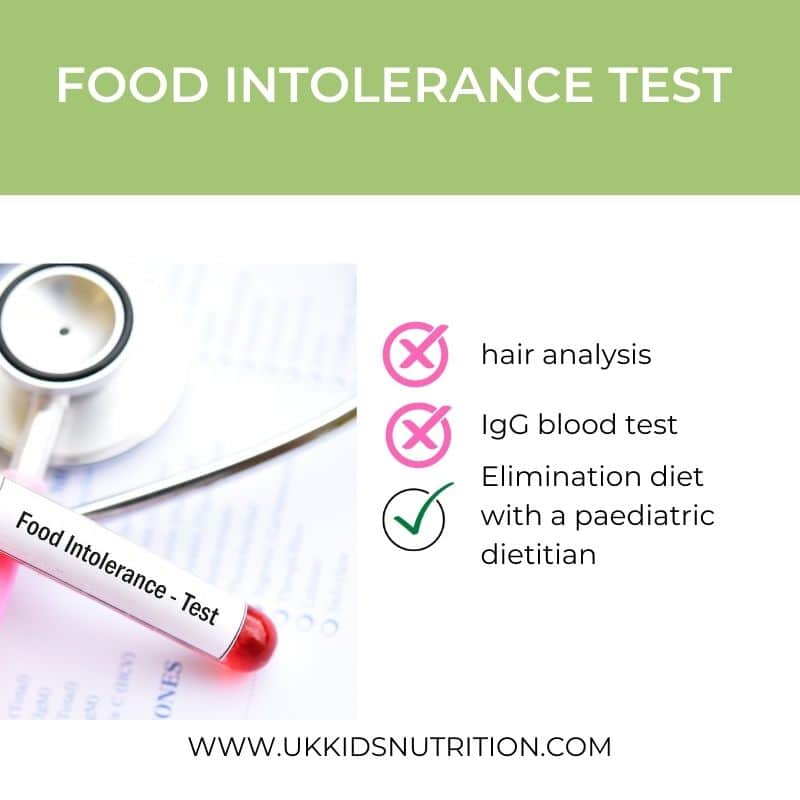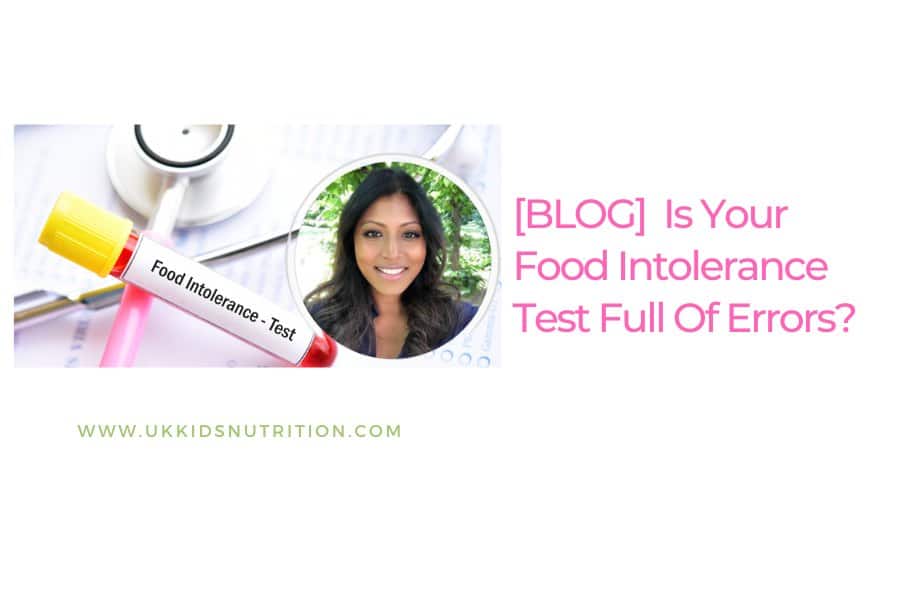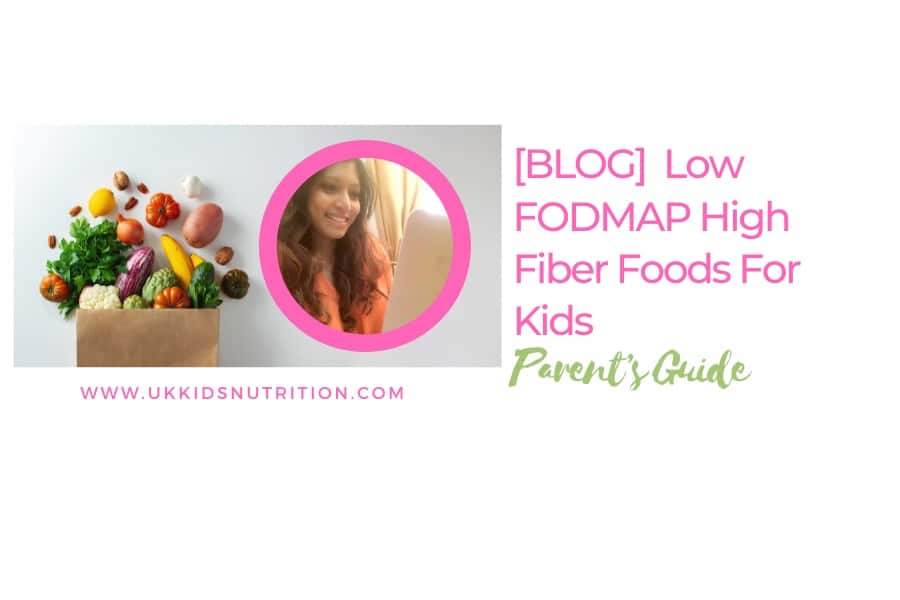Are you thinking about buying a food intolerance test for yourself or your child? With so many options available, it can be tempting to give them a try.
You’ll be surprised to know that not all of these tests are accurate!
Some can be shockingly misleading and full of errors.
In this article, we are going to dive into the world of food intolerance tests.
If you are concerned about your child’s frequent belly aches, diarrhoea, or potential food intolerance, I’ve got you covered.
We’ll start by defining what food intolerance is and then explore whether food intolerance tests are worth it.
By the end of this article, you’ll have a better understanding of the ins and outs of food intolerance testing.
It will also help you decide whether it’s the right choice for you and your family.
Let’s get started!
What is food intolerance?
Before we dive into the various intolerance tests, let’s discuss what is food intolerance.
With food intolerances, you or your child probably experience difficulty digesting certain foods.
This isn’t serious, but your child’s symptoms may be uncomfortable. It can disrupt their sleep and bowel habits.
The official explanation of food intolerance is that it is an adverse reaction to foods.
However, they are rarely life-threatening.
Food intolerance should not be confused with food allergy.
In food allergy, even a small amount of the culprit food can cause a reaction.
Symptoms of food intolerance
Back to food intolerance (which does not involve the immune system), here’s a list of the most common symptoms:
- Diarrhoea or porridge-like stools
- Bloating
- tummy pain
- Passing lots of gas or wind
Other symptoms of food sensitivities or intolerance include:
- Rashes
- Headaches
- Feeling tired
- Feeling sick
- Constipation
- Joint pain
What are the most common food intolerances and their symptoms?
Lactose intolerance
Lactose intolerance is fairly common, affecting both kids and adults.
In lactose intolerance, the human body can’t fully digest lactose.
Lactose is a sugar and type of carbohydrate found in milk and certain dairy products.
This happens because the digestive system lacks the enzymes needed to break it down.
Lactose intolerance can be diagnosed by hydrogen breath tests.
However, the most popular method for confirming a diagnosis is an elimination diet.
Sometimes people with irritable bowel syndrome can also have lactose intolerance.
Offer your child smaller portions of lactose-rich foods to see if this helps reduce bloating, gas and diarrhoea.
Gluten intolerance
If you or your child has been diagnosed with coeliac disease, it’s important to know that it’s a manageable condition.
In coeliac disease, your body reacts negatively to gluten.
Often, coeliac disease can be confused with gluten intolerance, here’s why.
If your child’s screening test comes back negative, they may not have eaten enough gluten-rich foods before testing.
Another reason could be that your child is sensitive to other foods in wheat like fructans, instead of gluten.
Please remember that there is no reliable gluten intolerance test or gluten allergy test (apart from coeliac disease screening).

FODMAPs
FODMAPS are a group of carbohydrates.
It’s an acronym for fermentable oligosaccharides, disaccharides, monosaccharides and polyols.
FODMAPS can be difficult for adults and children with irritable bowel syndrome to tolerate.
These short-chain carbohydrates (sugars) are not easily absorbed by the small intestine.
In the colon, it can cause gas when broken down in the digestive system.
Most people don’t notice this process. However, individuals with IBS may experience discomfort, tummy pain and changes in their poop pattern. This could be due to the gut-brain-communication axis.
Unfortunately, there are no IBS food intolerance tests. Certain foods rich in FODMAPs can trigger changes in stool patterns such as constipation, diarrhoea or both.
To help your child manage their symptoms, check out my IBS Kids Mastery Method.
It takes you through the Happy Belly Formula to identify, restore and thrive processes to fix your child’s most troublesome symptoms.
Learn more about the different types of poop in Kid Poop Chart & IBS Explained.
Histamine intolerance
Histamine intolerance is a condition where the body is unable to break down histamine properly.
This is a compound found in certain foods such as aged cheese, cured meats and fermented foods.
Symptoms may include headaches, hives, itching, flushing and gastrointestinal symptoms.
This condition is thought to be very rare but speak with your child’s doctor if you are worried.
Sulfite or sulphite sensitivity
Sulphite sensitivity is a condition where the body reacts negatively to sulphites.
Sulphites are used as a preservative in many foods and drinks.
Symptoms can range from mild to severe and may include headaches, hives, dizziness, stomach upset, wheezing, tingling or difficulty swallowing.
What is the difference between food allergy and food intolerance?
It’s important to understand the difference between food allergies and food intolerances.
While both can cause unpleasant symptoms, they have different underlying causes.
Food allergy involves the immune system and can be life-threatening in rare cases.
Whereas food intolerance is a digestive problem that causes discomfort.
Thankfully, it is not life-threatening.
It is crucial to note that food intolerance testing is not reliable for diagnosing food allergies.
The various tests look for different markers in the body and do not measure the same immune responses.
Relying on food intolerance testing to diagnose a food allergy can be dangerous. It may lead to a delayed or incorrect diagnosis, potentially putting the person at risk for a severe reaction.
So if you are wondering if food intolerance testing is reliable for food allergies, the answer is no.
Keep reading to learn more about food allergy and food intolerance testing.

Food allergy explained
IgE-mediated food allergy
When it comes to food allergies, such as IgE-mediated food allergy, the immune system doesn’t properly recognise certain food proteins.
This can result in an allergic reaction within a short time frame after consuming the food.
To diagnose immediate food allergies in children, a drop of test foods like eggs, milk, fish, and peanuts are placed on your child’s skin.
This procedure is called the skin prick test.
Skin prick testing is the best food allergy testing available to diagnose immediate food allergies.
If your child’s doctor suspects an immediate food allergy, they may also recommend a blood test. This will be part of their overall plan for food allergy testing.
It’s important to work closely with your child’s doctor. They can help to determine the best course of action for diagnosing and managing food allergies.
Food allergies can sometimes be serious and require proper medical treatment and management.
Non-IgE mediated food allergy
When it comes to non-Ige mediated allergies, symptoms can take longer to develop. Symptoms may not appear until up to 3 days after your child has eaten the trigger food.
Unlike IgE-mediated food allergies, skin prick tests are not effective for diagnosing non-IgE-mediated food allergies.
Currently, there are no reliable and scientifically proven tests available for diagnosing non-IgE or delayed food allergies.
This can be frustrating for parents who are seeking answers for their child’s symptoms.
However, it’s important to understand that food intolerant tests are not recommended.
I’ll explain why later in the article.
In the meantime, keep a food diary which can help identify potential trigger foods.
Food diaries can also help your doctor and paediatric dietitian pinpoint symptoms associated with food allergies.

What is a food intolerance test?
Food intolerance testing is a tool offered by commercial companies. They claim to test for intolerances by identifying potential food sensitivities and intolerances to specific foods.
However, in many cases, the results can be misleading. It may suggest that your child is intolerant to a food that they can eat without any issues.
This can be confusing and frustrating, especially if you remove foods from your child’s diet, based on these results.
Unfortunately, in the long term, you may find that removing these foods does not provide relief for the original symptoms.
Many dietitians and doctors caution that unnecessary dietary restrictions can be harmful to your child’s health.
Without expert nutrition reviews, they may miss out on important nutrients that are essential for growth and development.
Types of food intolerance test
Today there are many food intolerance tests available in the market.
Many will claim to be the best food intolerance test available. But be aware they host fake incredible reviews of their food sensitivity test.
Is food intolerance testing worth it?
Unfortunately, none of the following food intolerance tests for intolerances is reliable or accurate.
Nevertheless, let’s explore the various tests available and why they aren’t reliable food intolerance tests for both adults and children.
Different types of Food intolerances tests

Is food intolerance testing reliable?
There is no reliable food intolerance test online and the British Dietetic Association, agrees!
Don’t waste your hard-earned money on a food intolerance test!
Instead, work with a paediatric dietitian. He/she can review your child’s food diary to help identify possible delayed food allergies or food intolerances.
Keep reading to find out why a food intolerance test is not recommended.
IgG blood test
Did you know that food intolerance tests online work by measuring IgG antibodies? It works by using a blood sample that you send to the company.
Some of these tests claim to look for IgG4. If it comes back positive, they tell you that you or your child are intolerant to certain foods.
But here’s the thing, there’s no solid scientific evidence to support the accuracy of these tests.
Many allergy doctors warn that these tests can give a false negative result.
A food intolerance test may pick up on foods your child commonly eats. It cannot however identify the ones that you or your child might be sensitive or intolerant to.
Do hair food intolerance tests work?
In hair analysis, a small lock of hair is sent to a laboratory.
The laboratory then uses energy fields in the hair to determine food intolerances.
However, it’s important to note that these tests have limitations.
They can detect things like recreational drugs, lead and mercury poisoning. But they cannot confirm or deny whether your child is intolerant to any specific foods.
Hair food intolerance tests sound appealing, don’t they?
The bad news is that they simply don’t have the scientific backing to support their accuracy in identifying food intolerances.
Is the food sensitivity test accurate?
As you can see, it’s very questionable how reliable are food intolerance tests.
There are no reliable tests to determine food intolerance in both adults and children.
Unfortunately, many people don’t realise that food sensitivity tests are not accurate.
Relying on these tests won’t help you pinpoint the specific foods that you or your child are intolerant to.
Instead, it’s always a good idea to consult with a trained medical professional.
Paediatric dietitians can guide you in the right direction. They will provide you with accurate and meaningful information that you can rely on.
How do you check if your child has a food intolerance?
I use a step-by-step process to help families identify any possible food intolerances.
This process is called an elimination diet and it should be used under the guidance of an experienced paediatric dietitian.
If symptoms improve, then your dietitian will help you to reintroduce the food back into your child’s diet. But don’t worry, this is done in a controlled manner.
This elimination and reintroduction method helps to confirm or deny underlying food intolerances.
It’s perfect if you are looking to identify the culprit for leaky nappies, sore bellies, constipation and diarrhoea.
Due to the risk of nutritional deficiencies, please do not attempt to do this on your own.
Often multiple food groups are removed from children’s diets unnecessarily which can impact their growth and development.
Work with your child’s doctor and paediatric dietitian if you are worried about a food allergy or food intolerance.

What is the treatment for food intolerance?
The treatment will depend on the root cause of the belly ache, bloating, constipation and diarrhoea.
Often gluten-free diets or dairy-free diets are prescribed by professionals who are not fully trained in nutrition.
This leads to children following restrictive diets long term. Unfortunately, this could affect their gut health negatively and can compromise their normal growth and development.
Many of the children I work with find symptom resolution without the requirement for long-term elimination diets.
Instead, after a process of elimination and reintroduction, only true trigger foods are limited.
Can food intolerances go away?
It’s true that some types of food intolerances, such as lactose intolerance, tend to worsen with age.
This is because the amount of enzymes needed to break down lactose in dairy products decreases in the body.
On the flip side, it’s also possible for other food intolerances to improve with time.
This is why it’s important to look after your child’s gut health.
The reason is that our microbiome plays a crucial role in how we digest and absorb nutrients.
Making small positive changes to your child’s diet can help improve their gut health. This can ultimately reduce the symptoms of food intolerance.
So it’s important to keep in mind that managing food intolerances is not a one-size-fits-all approach.
For a personal approach to your child’s suspected food intolerances and tummy troubles, book a free assessment here.

Bottomline
Many online food intolerance tests rely on IgG food allergy testing. You now know that these are not scientifically proven testing methods.
Instead, it’s best to work with your child’s doctor for suspected food allergies.
Worried about food intolerances? Please don’t worry.
You can book a free assessment and initial 15-minute consultation. During the call, we will discuss whether my Kid’s gut health programme is a good fit for your child.
I offer a science-based approach to identifying and addressing food intolerances and gut health issues. Together, we can work towards improving your child’s digestive health and overall well-being.
Bahee Van de Bor is a registered paediatric dietitian, specialising in gut health, food intolerance and fussy eating.
Let Me Help
Is your child struggling with constipation, bloating/tummy pain or loose stools?
Then my proven Happy Belly Formula will help.
- 1-2-1 Happy Belly Club (Gut Health Programme)
- Or book a discovery call to learn more about the programme



